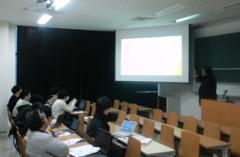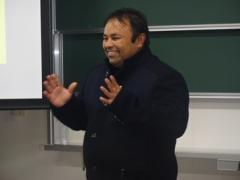
Computational Intelligence Approaches in Smart Energy Grids and Solar Energy Feasibility Studies (2018/1/11 九州大学)
2018/01/12
【科目種別】電気エネルギー講座Ⅱ(英語科目)
■講 師: Dr Ravinesh Chand Deo
■ご所属: Senior Lecturer
University of Southern Queensland, Australia
■演 題: Computational Intelligence Approaches in Smart Energy Grids and Solar Energy Feasibility Studies
■日 時:平成 30年 1月 11日(木)16:40〜18:10
■場 所:九州大学 伊都キャンパス ウエスト2号館 3階 第8講義室
【遠隔講義場所】
九州工業大学 ※受信なし
熊本大学 黒髪南地区 仮設プレハブD棟 1階 会議室B
福岡大学 ※受信なし
福岡工業大学 図書館 3F グループ学習室 03
■主 催:九州大学大学院システム情報科学研究院 電気システム工学部門
■共 催:九州パワーアカデミー
■概要
This public lecture will provide a non-technical narrative of computational intelligence approaches and their practical relevance in smart energy and power management systems including renewable energy feasibility studies. Smart energy management system need to be designed to monitor, optimize and control the Smart Grid Energy Market where consumers can enjoy a stable supply of energy with minimum impacts on the environment. Demand-side management, considered as an essential part of the energy management system, can enable the energy utility market operators to make better management decisions toward the trading of energy between consumers and the operators. A prior knowledge about the energy load patterns can help reshape the load and cut the energy demand curve, allowing a better management and distribution of energy in Smart Grid Energy Systems.
Designing a computationally intelligent load forecasting (ILF) system is often a pivotal goal of energy demand management.
This lecture is divided into five parts:
(i) To explore the state of art of computationally intelligent (CI) (i.e., machine learning) methods applied for load forecasting in terms of their classification and evaluation for sustainable operation of overall energy management systems.
(ii) To provide an overview and the practical applications of CI techniques in hydrogen production (as an example of renewable and sustainable energy source)
(iii) To showcase recent results from applying CI-based machine learning models for real-time, very short-term energy load forecasting using the case of Queensland’s energy demand data in Australia
(iv) To demonstrate how the CI-based data transformative models can be applied for renewable energy feasibility studies through a forecasting of the global incident solar radiation with different data transformative models.
(v) To enrich your knowledge on case studies of artificial intelligence models applied in renewable energy.
Without too much technical details, or convoluted and complex mathematically-driven equations, this lecture has been designed to enrich the master’s research students to better appreciate the importance of artificial intelligence models in today’s energy demand and energy security management systems. A review of different approaches in smart energy grids and solar energy feasibility studies will be presented with future research direction on this topic.
■Keywords :
Smart Grid; Load Forecasting; machine learning; Computational intelligence IC; demand-side management; alternative fuels, computational intelligent, hydrogen production, solar energy modelling; solar energy, short-term energy demand
【学生の関わり様】
Dr DeoにComputational Intelligence Approaches in Smart Energy Grid and Solar Energy Feasibility Studiesというタイトルで、スマートグリッドに活用可能な機械学習手法の概要、機械学習を用いた需要予測および日射量予測に関する最新の研究成果について講義をしていただいた。聴講学生からの質問を契機とした講師との議論もあり、有意義な講義であった。
■講 師: Dr Ravinesh Chand Deo
■ご所属: Senior Lecturer
University of Southern Queensland, Australia
■演 題: Computational Intelligence Approaches in Smart Energy Grids and Solar Energy Feasibility Studies
■日 時:平成 30年 1月 11日(木)16:40〜18:10
■場 所:九州大学 伊都キャンパス ウエスト2号館 3階 第8講義室
【遠隔講義場所】
九州工業大学 ※受信なし
熊本大学 黒髪南地区 仮設プレハブD棟 1階 会議室B
福岡大学 ※受信なし
福岡工業大学 図書館 3F グループ学習室 03
■主 催:九州大学大学院システム情報科学研究院 電気システム工学部門
■共 催:九州パワーアカデミー
■概要
This public lecture will provide a non-technical narrative of computational intelligence approaches and their practical relevance in smart energy and power management systems including renewable energy feasibility studies. Smart energy management system need to be designed to monitor, optimize and control the Smart Grid Energy Market where consumers can enjoy a stable supply of energy with minimum impacts on the environment. Demand-side management, considered as an essential part of the energy management system, can enable the energy utility market operators to make better management decisions toward the trading of energy between consumers and the operators. A prior knowledge about the energy load patterns can help reshape the load and cut the energy demand curve, allowing a better management and distribution of energy in Smart Grid Energy Systems.
Designing a computationally intelligent load forecasting (ILF) system is often a pivotal goal of energy demand management.
This lecture is divided into five parts:
(i) To explore the state of art of computationally intelligent (CI) (i.e., machine learning) methods applied for load forecasting in terms of their classification and evaluation for sustainable operation of overall energy management systems.
(ii) To provide an overview and the practical applications of CI techniques in hydrogen production (as an example of renewable and sustainable energy source)
(iii) To showcase recent results from applying CI-based machine learning models for real-time, very short-term energy load forecasting using the case of Queensland’s energy demand data in Australia
(iv) To demonstrate how the CI-based data transformative models can be applied for renewable energy feasibility studies through a forecasting of the global incident solar radiation with different data transformative models.
(v) To enrich your knowledge on case studies of artificial intelligence models applied in renewable energy.
Without too much technical details, or convoluted and complex mathematically-driven equations, this lecture has been designed to enrich the master’s research students to better appreciate the importance of artificial intelligence models in today’s energy demand and energy security management systems. A review of different approaches in smart energy grids and solar energy feasibility studies will be presented with future research direction on this topic.
■Keywords :
Smart Grid; Load Forecasting; machine learning; Computational intelligence IC; demand-side management; alternative fuels, computational intelligent, hydrogen production, solar energy modelling; solar energy, short-term energy demand
【学生の関わり様】
Dr DeoにComputational Intelligence Approaches in Smart Energy Grid and Solar Energy Feasibility Studiesというタイトルで、スマートグリッドに活用可能な機械学習手法の概要、機械学習を用いた需要予測および日射量予測に関する最新の研究成果について講義をしていただいた。聴講学生からの質問を契機とした講師との議論もあり、有意義な講義であった。











